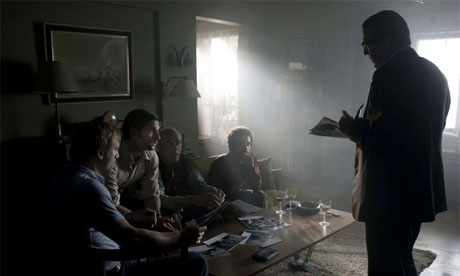
Munich (2005)
Director: Steven Spielberg
Entertainment grade: C+
History grade: C+
In 1972, the terrorist group Black September kidnapped and murdered 11 Israeli athletes, officials and trainers at the Munich Olympics.
Media
In the early hours of 5 September 1972, eight armed men sneak into the Olympic village in Munich, break into the Israeli team's headquarters and take 11 hostages. These tense opening sequences are brilliantly and accurately done, intercutting TV reports with documentary footage and meticulous recreation. The Munich hostage drama, lasting 20 hours, was the first time a major terrorist attack became a live television event. This film captures that with great skill.
Spies
Israeli prime minister Golda Meir (Lynn Cohen) orders the country's security agency, the Mossad, to track down and kill the perpetrators of the attack. Agent Avner Kaufman (Eric Bana) is given a deathlist of names. Kaufman is a fictional character, but approximates to Juval Aviv, who claims to have been a similarly-tasked agent in the 1970s. His claims informed the book Vengeance, by George Jonas, on which Munich is partly based. It has been disputed. Fictionalising the character to some extent allows Munich to dodge the thorny problem of Aviv's veracity.
Politics
"This is a very, very tough subject, and we've tried to approach it honestly and fairly," said director Steven Spielberg in an introductory talk. With a context as likely to upset people as the Israel-Palestinian situation, and a murky story full of contradictory and mostly unverifiable allegations, the film steers a careful political course towards something like balance. Even so, it has been beset by criticism that it is either pro- or anti-Israel. As usual, much of the fuss was made before its release by people who hadn't actually seen the film – allegedly including Israel's then prime minister, Ariel Sharon.
People
The movie's Avner is a family man, tormented by doubts about the moral and political value of his assassination work. His supporting cast of fellow agents has been conveniently designed to act out the big questions for the audience's benefit. So Carl (Ciaran Hinds) is the "good" one, arguing that the Israeli state hasn't always been perfect: "How do you think we got control of the land? By being nice?" Meanwhile, Steve (Daniel Craig) is the "bad" one, seething with sadistic revenge fantasies: "The only blood that matters to me is Jewish blood." Think Predator in a yarmulke. The reality is difficult to establish, but it probably wasn't like this. "In interviewing more than 50 veterans of the Mossad and military intelligence, I found not a single trace of remorse," wrote Aaron J Klein, author of a book about the operation. "On the contrary, the Mossad combatants thought they were doing holy work." This would, of course, have made for a much less sympathetic film.
Mistakes
Avner begins to doubt whether the names on his list were accurate. "I want you to give me proof that everyone we killed had a hand in [the Munich massacre]," he tells his case officer (Geoffrey Rush). It's incongruous in this context that Spielberg leaves out the most famous blunder. On 21 July 1973, Israeli gunmen shot and killed a Moroccan waiter called Ahmed Bouchiki in Lillehammer, Norway. They had mistaken him for Black September mastermind Ali Hassan Salameh. Six Israelis were arrested for their involvement. Five were convicted. In Jonas's book, the Lillehammer affair is attributed not to Aviv but to a different cell. Perhaps that is the reason it isn't here. Also, the film is already half an hour too long. It's a pity, though. This stark real-life example would have added weight to Munich's theme of the uncertainties of spycraft – and to the story of Salameh (Mehdi Nebbou), who is a substantial character in the movie.
Verdict
A stylish and well-intentioned action thriller that tries to ask big questions, but is stumped for answers.

